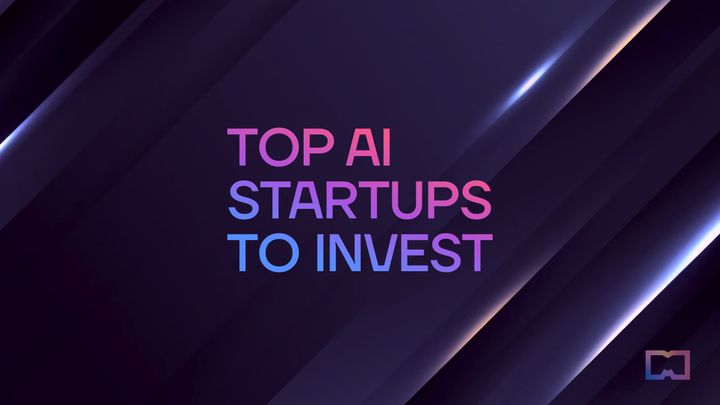AI has emerged as a transformative force in the fast-paced world of technology. AI is changing how businesses operate, from improving customer experiences to automating complex tasks. For AI startups present exciting opportunities for investors looking to capitalize on this disruptive trend, AI startups present exciting opportunities. This article will delve into the top 20 AI startups to consider investing in for 2023. These startups have been carefully selected based on their market potential, team expertise, technological innovation, and funding history.

Why Invest in AI Startups?
Before we dive into the list of top AI startups, let’s explore why investing in AI startups is a wise choice. AI is longer a niche technology; it has become an integral part of various industries, including healthcare, finance, e-commerce, and more. Here are some compelling reasons to consider AI startups for your investment portfolio:
Now that we understand the potential of AI startups let’s explore the top 20 AI startups to keep an eye on in 2023.
1. Abnormal Security
Industry: Email security
Funding: $74 million1
Overview
Abnormal Security is a cloud-native email security platform that uses behavioral data science and artificial intelligence to stop modern email attacks. The company was founded in 2018 and is based in San Francisco, California. Abnormal Security claims to protect more than 5% of Fortune 1000 companies from email-based cybercrime, such as phishing, business email compromise, supply chain fraud, and ransomware.
Abnormal Security’s platform integrates with cloud email providers, such as Microsoft 365 and Google Workspace, and analyzes each organization’s communication patterns, relationships, and business processes. It then uses machine learning models to detect and block abnormal and malicious emails that can bypass traditional security systems. Abnormal Security also provides visibility and remediation tools for security teams, as well as awareness training for employees.
Abnormal Security’s platform has three main products: inbound email security, outbound email security, and cloud security posture management. Inbound email security protects the organization from external threats like impersonation, credential theft, and malware. Outbound email security protects the organization from internal threats like data loss, account takeover, and misdirected emails. Cloud security posture management helps the organization identify and fix configuration gaps that can expose the cloud email environment to risks.
Pros:
Cons:
2. Adept AI
Industry: Construction
Funding: $10 million1
Overview
Adept AI is a machine learning research and product lab that aims to build general intelligence by enabling creative collaboration between humans and computers. The company was founded in 2022 and is based in San Francisco, California. Adept AI’s mission is to create an AI teammate for everyone that can understand natural language goals and execute them on various software tools.
Adept AI’s main product is ACT-1, a large-scale transformer model that can perform actions on digital tools, such as web browsers, spreadsheets, databases, and APIs. ACT-1 can take plain language commands and turn them into sequences of steps that achieve the desired outcome. For example, ACT-1 can book a flight, create a chart, or send an email based on natural language instructions.
Adept AI has raised $10 million in seed funding from investors such as Andreessen Horowitz, First Round Capital, and Naval Ravikant. The company is currently in stealth mode and plans to launch an alpha version of its product soon. Adept AI is also hiring engineers, researchers, and designers to join its team.
Pros:
Cons:
3. Affectiva
Industry: Emotion recognition
Funding: $62 million
Overview
Affectiva AI is a software company that builds artificial intelligence that can understand human emotions, cognitive states, activities, interactions, and objects by analyzing facial and vocal expressions. The company was founded in 2009 and is based in Boston, Massachusetts. Affectiva AI’s vision is to humanize technology and create positive social impact.
Affectiva AI’s main product is Affectiva Automotive AI, a driver monitoring system that can detect levels of driver impairment caused by physical distraction, mental distraction, drowsiness, and more. Affectiva Automotive AI can also monitor the mood and engagement of passengers and personalize the in-cabin experience accordingly. Affectiva Automotive AI is used by leading automotive OEMs, Tier 1 suppliers, ridesharing providers, and fleet management companies.
Pros:
Cons:
4. Agora
Industry: Real-time engagement
Funding: $125 million
Overview
Agora.io is a company that enables developers to create engaging and immersive applications that leverage real-time voice and video communication. Agora.io’s platform provides simple, flexible, and powerful APIs that can be integrated into any application, on any device, anywhere in the world.
With Agora.io, developers can build applications that allow users to see, hear, and interact with each other in real-time, such as live streaming, chat, voice/video calls, gaming, education, social media, e-commerce, and more. Agora.io also offers artificial intelligence capabilities that can enhance the user experience, such as noise cancellation, speech recognition, face beautification, and background segmentation.
Pros:
Cons:
5. Alation
Industry: Data intelligence
Funding: $217 million
Overview
Alation is a company that provides data intelligence solutions that help organizations discover, understand, and govern their data assets. Alation’s flagship product is a data catalog that uses machine learning to automatically scan, index, and annotate data sources across the enterprise. Alation’s data catalog enables users to search, query, and collaborate on data and manage data quality, privacy, and compliance.
Alation also offers other products that support data governance, data literacy, and cloud migration. Alation was founded in 2012 and is based in Silicon Valley. Alation is recognized as a leader in the data catalog market and has more than 250 customers, including Salesforce, Cisco, and Pfizer. Alation’s mission is to help enterprises create thriving data cultures where anyone can find, understand, and trust data.
Pros:
Cons:
6. Algolia
Industry: Search-as-a-service
Funding: $315 million
Overview
Algolia is a company that provides hosted search APIs that enable developers to easily add robust search to their websites and applications. Algolia’s search engine uses natural language processing and machine learning to deliver relevant, personalized, and typo-tolerant results.
Algolia’s search APIs are flexible, scalable, and secure, with over 10,000 servers globally that ensure fast and consistent performance. Algolia’s APIs support various languages, platforms, and frameworks, and allow developers to customize every aspect of the search experience, from indexing to ranking to UI design.
Pros:
Cons:
7. Amplitude
Industry: Product analytics
Funding: $336 million
Overview
Amplitude is a company that provides product analytics and event tracking platform that helps businesses understand and optimize their user behavior, engagement, and retention. Amplitude’s platform enables product teams to collect, analyze, and act on user data across the entire product lifecycle, from acquisition to activation to retention.
Amplitude’s platform consists of three main components: Amplitude Analytics, Amplitude Experiment, and Amplitude Recommend. Amplitude Analytics is a tool that allows product teams to track, measure, and visualize user behavior, segment users, and identify key insights and opportunities. Amplitude Experiment is a tool that allows product teams to run A/B tests and feature flags to optimize user experience and outcomes. Amplitude Recommend is a tool that allows product teams to deliver personalized recommendations and experiences to users based on their behavior and preferences.
Pros:
Cons:
8. Anyscale
Industry: Distributed computing
Funding: $60 million
Overview
Anyscale is a company that provides a cloud platform and developer tools for running Python, machine learning, and analytics workloads at scale. Anyscale’s platform is based on Ray, an open source project that enables distributed computing and AI applications.
Anyscale’s platform consists of three main components: Anyscale Development, Anyscale Production, and Anyscale Academy. Anyscale Development is a tool that allows developers to build, test, and debug scalable AI and Python applications on Ray using their own IDEs and frameworks. Anyscale Production is a tool that allows developers to deploy, manage, and monitor scalable AI and Python applications on Ray using their own cloud providers. Anyscale Academy is a tool that provides online courses, tutorials, and community support for learning Ray and Anyscale.
Pros:
Cons:
9. AppZen
Industry: Expense auditing
Funding: $136 million
Overview
AppZen is a company that provides automated expense auditing using AI. Their platform analyzes expense reports, credit card charges, and invoices to detect compliance issues, fraud, or money leakage. AppZen’s platform helps finance teams to reduce costs, increase efficiency, and improve accuracy.
AppZen’s platform consists of two main products: AppZen Expense Audit and AppZen Autonomous AP. AppZen Expense Audit is a tool that allows finance teams to customize their expense policies and streamline their enforcement. AppZen Expense Audit uses deep learning, semantic analysis, and computer vision to review every expense claim and receipt in real time, flagging any violations, duplicates, or anomalies. AppZen Expense Audit also enables faster reimbursements and better employee satisfaction.
Pros:
Cons:
10. Aurora Innovation
Industry: Self-driving vehicles
Funding: $1 billion
Overview
Aurora Innovation is a company that is developing self-driving vehicle technology including hardware, software, and data services. Their systems can support level 4 autonomous driving across multiple vehicle types, such as passenger cars, trucks, and delivery vans.
Aurora Innovation’s technology is based on the Aurora Driver, a computer system that can be integrated into cars for autonomous driving. The Aurora Driver consists of three main components: Aurora Vision, Aurora Radar, and Aurora Command. Aurora Vision is a sensor suite that uses cameras, lidar, and ultrasonic sensors to perceive the environment. Aurora Radar is a long-range radar system that detects objects and their velocities. Aurora Command is a software platform that plans the optimal path and controls the vehicle’s actions.
Pros:
Cons:
11. Brex
Industry: Business banking
Funding: $1.2 billion
Overview
Brex is a company that is reinventing B2B banking by offering corporate cards and spend management software designed specifically for startups and high-growth companies. Brex uses real-time underwriting and AI/ML to offer instant approvals, higher limits, and tailored rewards.
Brex’s products include Brex Card, Brex Cash, Brex Premium, and Brex Global. Brex Card is a business charge card that does not require a personal guarantee or credit check. Brex Cash is a cash management account that pays interest and has no fees. Brex Premium is a subscription service that provides advanced features and benefits. Brex Global is a solution that supports global spending and multinational operations with local-currency cards, local billing, and locally funded reimbursements.
Pros:
Cons:
12. C3.ai
Industry: Enterprise AI platform
Funding: $228 million
Overview
C3.ai is a company that offers a platform to help organizations develop, deploy, and operate enterprise AI applications. Their software helps manage full lifecycle AI development while handling scale and security.
C3.ai’s platform consists of three main components: C3 AI Suite, C3 AI Applications, and C3 AI Ex Machina. C3 AI Suite is a tool that allows developers to design, build, and run AI applications using a model-driven architecture and a low-code environment. C3 AI Applications are pre-built solutions that address specific business problems in various domains, such as manufacturing, energy, healthcare, and finance. C3 AI Ex Machina is a tool that enables analysts and business users to create and execute AI workflows without coding.
Pros:
Cons:
13. Cape Privacy
Industry: Encrypted learning
Funding: $20 million
Overview
Cape Privacy is a company that has developed Enclave, an encrypted learning platform that allows organizations to collaborate on sensitive data sets without exposing raw data. Their cryptographic techniques enable privacy-preserving data analysis.
Enclave is a cloud-based platform that leverages secure multi-party computation (SMPC) and homomorphic encryption (HE) to enable data owners and data consumers to perform joint computations on encrypted data. Enclave allows users to define policies, workflows, and algorithms for data collaboration, and ensures that only the desired outputs are revealed. Enclave also provides audit trails, access controls, and compliance reports.
Pros:
Cons:
14. Casetext
Industry: Legal research
Funding: $48 million
Overview
Casetext is a company that offers AI-powered legal research to help lawyers find relevant case law and regulations faster. Their CARA platform combines ML, NLP, and crowdsourcing to improve legal search.
CARA is a cloud-based platform that allows lawyers to upload a legal document, such as a brief or a complaint, and get a list of relevant authorities that may have been missed. CARA uses ML and NLP to analyze the document’s arguments, facts, and citations, and match them with the most authoritative sources from Casetext’s database of over 10 million cases, statutes, and regulations. CARA also leverages crowdsourcing to incorporate insights from other lawyers who have used the platform.
Pros:
Cons:
15. Celonis
Industry: Process mining
Funding: $1 billion
Overview
Celonis is a company that offers process mining software that uses AI to analyze operational process workflows and identify inefficiencies. Their platform integrates data from across enterprise systems. Celonis’s software is based on the Celonis Execution Management System (EMS), a cloud-based platform that enables organizations to optimize their execution capacity.
The Celonis EMS consists of four main components: Celonis Studio, Celonis Snap, Celonis Core, and Celonis Solutions. Celonis Studio is a tool that allows users to create custom applications and dashboards. Celonis Snap is a free version of the platform for small teams and individuals. Celonis Core is the engine that extracts, transforms, and analyzes data from various sources. Celonis Solutions are pre-built applications that address specific use cases in finance, supply chain, customer service, and sales domains.
Pros:
Cons:
16. Cerebras Systems
Industry: AI chips
Funding: $475 million
Overview
Cerebras is a company that develops high-performance AI compute platforms consisting of specialized hardware, software, and infrastructure. Their Wafer-Scale Engine is designed to accelerate deep learning workloads.
Cerebras’s flagship product is the Cerebras CS-2, a system that contains the Cerebras Wafer-Scale Engine 2 (WSE-2), the largest chip ever built. The WSE-2 has 2.6 trillion transistors and covers more than 46,000 square millimeters of silicon. The WSE-2 can process information more quickly than conventional chips, reducing the training time of neural networks from months to minutes. The CS-2 also includes software tools and libraries that enable users to run various AI applications on the WSE-2.
Pros:
Cons:
17. Clearview AI
Industry: Facial Recognition
Funding: $8.6 million
Overview
Clearview AI is a company that provides facial recognition software and database access to law enforcement agencies and private companies. They have scraped billions of images from public websites to power their technology.
Clearview AI’s software is based on a proprietary algorithm that matches faces to a database of more than 20 billion images indexed from the Internet, including social media applications. The software allows users to upload a photo of a person and get a list of possible matches with links to the sources. The software can also work with low-quality images, such as CCTV footage or sketches.
Pros:
Cons:
18. ClimaCell
Industry: Weather intelligence
Funding: $185 million
Overview
ClimaCell is a company that offers global weather forecasting data and analytics to businesses across aviation, on-demand services, energy, and automotive industries. They use AI, IoT, and wireless signals.
ClimaCell’s technology is based on a proprietary platform that collects and analyzes data from various sources, such as satellites, radars, ground sensors, IoT devices, and wireless networks. The platform uses AI and machine learning to create high-resolution, real-time, and hyperlocal weather forecasts and insights. The platform also enables users to create custom alerts, dashboards, and scenarios based on their specific needs.
Pros:
Cons:
19. Databricks
Industry: Data analytics
Funding: $1.9 billion
Overview
Databricks is a unified analytics platform that combines data warehouses and data lakes into a lakehouse architecture. It is designed for building, deploying, sharing, and maintaining enterprise-grade data, analytics, and AI solutions at scale. The Databricks Lakehouse Platform integrates with cloud storage and security in your cloud account and manages and deploys cloud infrastructure on your behalf.
Databricks provide a collaborative workspace for all your data, analytics, and AI workloads. It offers automated and reliable ETL, open and secure data sharing, lightning-fast performance, ready access to the freshest and most complete data, and the power of Databricks SQL. Databricks also provides solutions that accelerate machine learning across the entire lifecycle. The lakehouse forms the foundation of Databricks Machine Learning – a data-native and collaborative solution for the full machine learning lifecycle from featurization to production. Databricks is used by many companies such as Comcast, Shell, HP, Nielsen, and H&M.
Pros:
Cons:
20. Cognite
Industry: Industrial data ops
Funding: $250 million
Overview
Cognite provides an industrial data operations and contextualization platform for organizations in asset-heavy industries like oil and gas, manufacturing, and utilities. Their solution structures and contextualizes OT/IT data.
Cognite is a company that provides a data operations and contextualization platform for industrial sectors. The company’s main product is Cognite Data Fusion, which uses artificial intelligence to ingest, process, and enrich industrial data from various sources. Cognite Data Fusion enables customers to access and understand complex industrial data in one collaborative workspace.
Pros:
Cons:
Comparison Sheet: Top 20 AI Startups to Invest in 2023
Source: mPost



